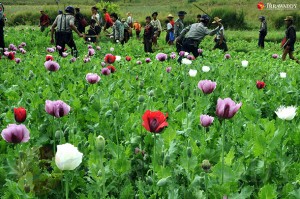NLD’s Trip into the Murky World of the Drugs Trade
By Burma Partnership • February 2, 2016 As the new Parliament sits for the first time in Naypyidaw, the National League for Democracy’s (NLD) choice of Union Solidarity and Development Party (USDP) member, T Khun Myat, as deputy lower house speaker demonstrates the intricate and complex web that links the USDP, the Burma Army, the drugs trade, and paramilitary drug militias as well as the dangerous ground the NLD treads in attempting to form a government of national reconciliation.
As the new Parliament sits for the first time in Naypyidaw, the National League for Democracy’s (NLD) choice of Union Solidarity and Development Party (USDP) member, T Khun Myat, as deputy lower house speaker demonstrates the intricate and complex web that links the USDP, the Burma Army, the drugs trade, and paramilitary drug militias as well as the dangerous ground the NLD treads in attempting to form a government of national reconciliation.
T Khun Myat is an ethnic Kachin who for the past five years represented the USDP as a Member of Parliament (MP) for Kutkai Township, northern Shan State, and was also head of the Lower House Bill Committee. Before that, his long-standing ties with the military regime included being secretary of the Kutkai Township Peace and Development Council and he also participated in the drafting of the 2008 Constitution in 2007. This dalliance with individuals with ties to the military regime has caused some concern among NLD leadership, citing the lack of trust in the Burma Army.
It is not just T Khun Myat’s ties with the USDP and the former military regime that have caused concern, but his alleged role in the narcotics trade is also causing consternation. A series of reports by the Shan Herald Agency for News (S.H.A.N.) places T Khun Myat as a leader of a Kutkai militia force that is involved in the trafficking of drugs through Kutkai Township. He was also alleged to be a shareholder in the Myanmar Mayflower Bank before its liquidation. A leaked US Cable stated, “MMB’s links to narco-traffickers, and their money-laundering activities, are indisputable.”
T Khun Myat is not the only USDP MP with ties to the drug trade, particularly in Shan State. People’s militia forces (PMFs) have been used for decades by the Burma Army and the Burma Government to fight the ethnic armed organizations whose goals are politically motivated rather than economically driven. In return, PMFs are granted a large degree of autonomy to operate in the production and trafficking of both opium and methamphetamines. The leaders of some of these PMFs, have served in Parliament for the past five years. Burma Army commanders are also tacitly complicit in the drugs trade, making Burma the second highest producer of opium in the world and supplying much of the region’s methamphetamines, or as it is commonly known, Ya Ba.
Domestically, Burma, and especially in the drug-producing areas of Shan and Kachin States, an epidemic of addiction is tearing communities apart. In lieu of ineffective state policies towards the drug trade as well as the lack of political will to tackle the issue, teams of church-backed vigilantes have taken matters into their own hands. In an attempt to to cure their communities of addiction, they take drug addicts into custody for forceful detoxification programs and burn poppy fields. This came to an ugly climax as poppy farmers shot dead a member of a team that was burning poppy fields in Kachin State on 15 January, 2016.
This shooting also reflects the desperation of the poppy farmers themselves as they remain trapped in poverty with little livelihood alternatives such as crop substitution schemes. According to a report by the Myanmar Opium Farmers Forum released in December 2015, “The large majority of opium farmers are not rich and grow it for their survival. Therefore, they should not be treated as criminals.”
Such desperate measures and situations underline the terrible damage that druglords such as T Khun Myat are fuelling. Yet for the NLD to appoint this controversial figure in a high-profile position is a major risk to their credibility. The NLD would do well to incorporate ethnic leaders from political parties as the Shan Nationalities League for Democracy, parties that are free from ties to the military and the drugs trade while also enjoying popular support among ethnic people. There must also undertake a radical re-think of the drug laws and policies that are currently in place so that victims of addiction can be rehabilitated and poppy farmers have a sustainable alternative to growing opium. This also necessitates a political will that has been lacking as the previous military regime, as well as the USDP Government, supported and enabled druglords and narcotics-trafficking militias to operate with impunity. Otherwise, the drugs epidemic that is destroying communities and fuelling violence in many parts of northern Burma will continue, and individuals such as T Khun Myat will continue to enjoy wealth and political power.
Tags: Burma Partnership, Business and Human Rights, Drugs, Kachin State, National League for Democracy, Poppy, Shan State, Union Solidarity and Development PartyThis post is in: Blog
Related PostsBurma Partnership Celebrates Continuing Regional Solidarity for Burma and Embraces the Work Ahead for Progressive Voice
Burma Army Displays Blatant Disregard for 21st Century Panglong Peace Process
Ann Din Coal Power Plant: Local Movement and Action to Preserve and Protect Natural Resources and Land: Mon IDP Report Case Study #4
Latest Human Rights Abuse Case Demonstrates Urgent Need to Reform the Myanmar National Human Rights Commission
Human Rights Far From Guaranteed as US Sanctions on Burma Are Removed









 All posts
All posts